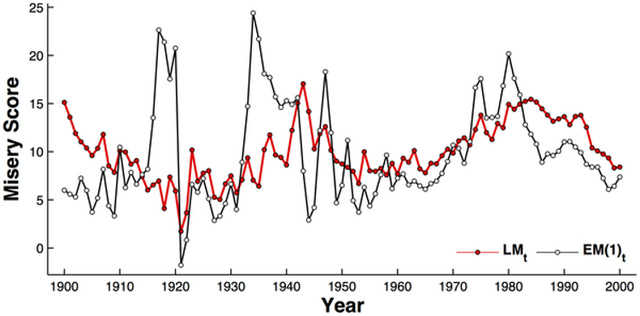Books Get More Depressing If The Economy Is Bad
2014.01.10
According to new research, when the economy starts to stink, authors start to adopt a more depressing vocabulary. That's right, all the books you've been reading as of late sound a tad bit miserable.
A recent study out of London took different "mood words" and broke it up into six categories: anger, disgust, fear, joy, sadness and surprise.
The researchers then made a "literary misery index" to gauge the relative number of positive moods against the negative moods in 20th century books.
Books released after periods of economic distress use language that reflect a general malaise. Books from the 1930s and 1970s era saw an explosion of downer books. From the new study:

"When we looked at millions of books published in English every year and looked for a specific category of words denoting unhappiness, we found that those words in aggregate averaged the authors' economic experiences over the past decade," Professor Alex Bentley of the University of Bristol, a lead author of the new study said in a statement.
"In other words, global economics is part of the shared emotional experience of the 20th century," Bentley explained.
How will this affect our moods then? A study is needed for this!
[Smithsonian]
A recent study out of London took different "mood words" and broke it up into six categories: anger, disgust, fear, joy, sadness and surprise.
The researchers then made a "literary misery index" to gauge the relative number of positive moods against the negative moods in 20th century books.
Books released after periods of economic distress use language that reflect a general malaise. Books from the 1930s and 1970s era saw an explosion of downer books. From the new study:
Visually, the literary misery index seems to respond to major phases of the 20th century: literary misery increased after the economic Depression, then declined after the post-War years, then rose again after the recession of the 1970s, and declined again following on from the economics recovery of the late 1980s.

"When we looked at millions of books published in English every year and looked for a specific category of words denoting unhappiness, we found that those words in aggregate averaged the authors' economic experiences over the past decade," Professor Alex Bentley of the University of Bristol, a lead author of the new study said in a statement.
"In other words, global economics is part of the shared emotional experience of the 20th century," Bentley explained.
How will this affect our moods then? A study is needed for this!
[Smithsonian]
More Articles
Copyright © Fooyoh.com All rights reserved.